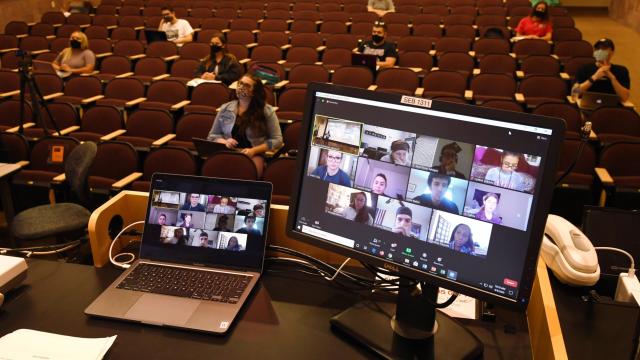One of the (many) significant social shifts thrust upon humanity during the pandemic was the sudden switch to remote learning and pre-recorded lectures. While recorded lectures and online education as a whole have been around for years, the early months of the pandemic forced millions to accept it as the new norm.
Now, as many universities experiment with how best to navigate in-person classes, many are sticking with the practice as a way to reduce time spent in person and potentially allow more flexibility with when and where students can learn. Students have learned new tricks to adapt along the way, one of the most common being the speeding up of a video’s playback.
In theory, speeding up a video, especially for lengthy lectures, can save students huge chunks of time. (It also lets them breeze through whenever a professor inadvertently breaks a slide show or backtracks after forgetting to make their mouse viewable on presentation mode). But does that convenience and speed come at a cost to performance? It turns out, maybe not.
That’s according to findings in a new paper published in Applied Cognitive Psychology, which found no major difference in performance between students who watched a lecture on normal speed versus those who watched a lecture on 1.5X or 2X speed. Under some specific circumstances, students could actually improve their testing performance after watching a lecture on 2X speed.
The researchers had 231 UCLA students watch YouTube videos about real estate appraisals and the Roman Empire and gave them a comprehension test afterward. The students did this on two separate occasions, regardless of the speed of the video. The researchers found students who watched the videos on 1.5X and 2X speeds showed no drop off in comprehension compared with those who watched at the normal pace. So, at least within the confines of this particular study, the data suggests students really can spend half the time watching a video and get the same out of it. There’s a limit though. Participants who watched videos at 2.5X speeds or faster did see noticeable drop-offs in performance.
It also didn’t matter what order students watched the normal or sped up videos when they mixed the two. Though 76% of the respondents in the study thought watching a video first at normal speeds and then sped up would lead to better results, the study didn’t bear that out and saw no significant difference in what order students watched their sped-up video. Those results actually contradicted the students’ expectations. While 85% said they regularly sped up their own lecture videos, 91% thought regular speed or 1.5X sped would lead to better results than 2X or 2.5X speeds.
The more interesting results of the study occurred when students watched the same lecture twice at double speed. When students watch the sped-up videos twice, with one viewing occurring immediately before their test, the students’ scores were higher than those who only watched a video once.
Really those findings shouldn’t come as too much of a surprise to anyone who has walked into a classroom auditorium in the frantic, sweaty moments prior to an exam. Students regularly speed cram as much material as possible right before an exam. In a less anxious way, these results seem to mirror that effect in some way.
The researchers were also quick to note the limitations of their study. Though these results worked for students watching videos about real estate and Romans, it’s unclear if the same results would replicate for students trying to learn Chemistry, Art History, or any other discipline. The students also weren’t allowed to pause or take notes while watching the videos, both of which are regular practices for students in the real world.
Still, the results are a promising sign for students looking to carve back some time for themselves.
